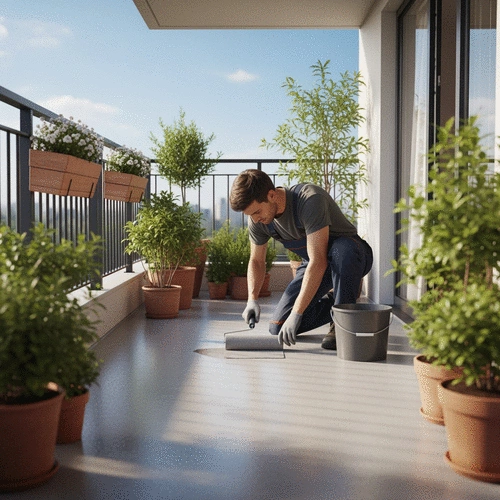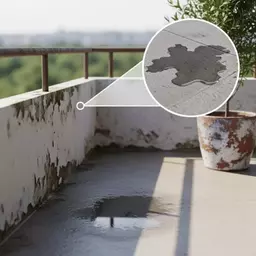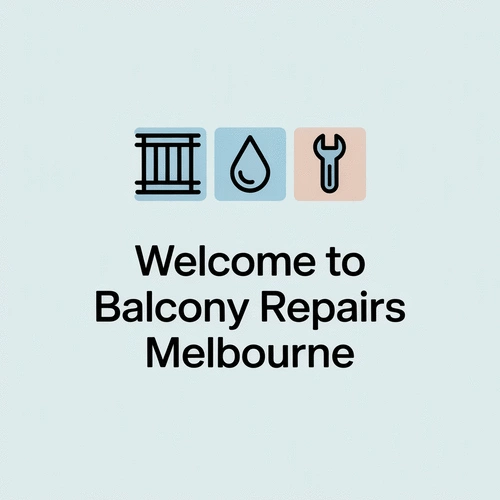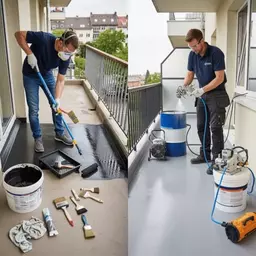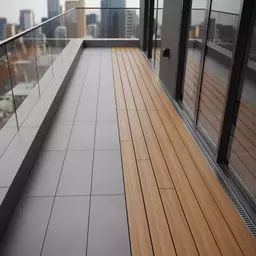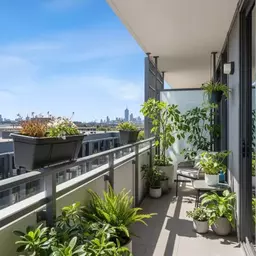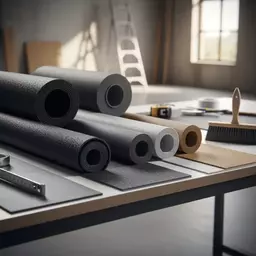Balcony waterproofing is often overlooked, yet it's one of the most critical aspects of home maintenance. A single rainstorm can reveal hidden vulnerabilities in your outdoor spaces, leading to costly repairs down the line. Are you ready to protect your investment and enhance your outdoor experience? Dive into these essential insights!
What You Will Learn
- Proper balcony waterproofing prevents water damage, protecting the structural integrity of your home.
- Neglecting waterproofing can lead to costly repairs, mold growth, and decreased property value.
- Assessing your balcony's structural integrity and drainage slope is crucial before waterproofing.
- Opt for eco-friendly waterproofing materials to enhance safety and reduce environmental impact.
- Weather conditions significantly affect the waterproofing process; plan your project accordingly.
Key Considerations for Balcony Waterproofing
Protecting your balcony involves understanding the benefits of waterproofing, the risks of neglecting it, and crucial preparation steps. This visual outlines these three core areas, emphasizing why balcony waterproofing for Melbourne weather is so vital.
Benefits of Waterproofing
- ✓Prevents Water Damage
- ✓Increases Longevity
- ✓Enhances Safety
Consequences of Neglect
- ×Structural Damage
- ×Mold & Mildew Growth
- ×Decreased Property Value
Preparation for Waterproofing
- ●Evaluate Structural Integrity
- ●Inspect Drainage Slope
- ●Identify Pre-existing Damage
Environmental & Safety Aspects
- ★Choose Eco-friendly Materials
- ★Prioritize Safety During Application
- ★Consider Weather Conditions
Understanding the Importance of Balcony Waterproofing
As a seasoned expert in balcony restoration, I've seen firsthand how crucial balcony waterproofing is for homeowners. Imagine stepping onto your balcony after a rainstorm, only to find water pooling and causing damage to your beautiful outdoor space. Proper waterproofing not only protects the structural integrity of your balcony but also enhances its aesthetic appeal and functionality. So, why should every homeowner prioritize this essential task?
Why Every Homeowner Should Consider Waterproofing Their Balcony
Waterproofing your balcony is more than just a maintenance task—it's a vital step in safeguarding your investment. Here are a few key reasons to consider:
- Prevention of Water Damage: Effective waterproofing prevents moisture from infiltrating and causing rot and decay.
- Increased Longevity: A well-protected balcony can last significantly longer, minimizing the need for costly repairs.
- Enhanced Safety: Waterproofing reduces the risk of slips and falls due to standing water or ice.
By prioritizing waterproofing, you’re not only protecting your property but also ensuring a safe and enjoyable outdoor experience for you and your loved ones!
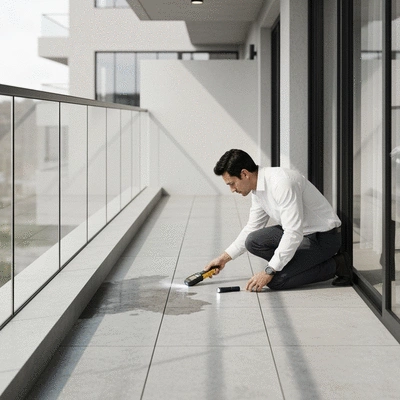
Consequences of Neglecting Balcony Waterproofing
Neglecting balcony waterproofing can lead to serious issues that are often costly and time-consuming to repair. Consider these potential consequences:
- Structural Damage: Water infiltration can weaken the balcony's structure, leading to dangerous situations.
- Mold and Mildew Growth: Moisture creates a breeding ground for mold, which can affect health and indoor air quality.
- Decreased Property Value: Water damage and neglect can significantly reduce your property’s value, making it less appealing to buyers.
As someone who's dedicated to balcony repair, I can’t stress enough the importance of addressing these issues before they escalate. A proactive approach will always save you time, money, and stress in the long run! For more detailed information on identifying such issues, consider reading about how to spot balcony leaks in homes.
Preparing for the Waterproofing Process
Before diving into the waterproofing process, proper preparation is key. Assessing your balcony can set the stage for success and ensure you choose the right solutions for your needs. Here are some important factors to consider:
- Evaluate Structural Integrity: Check for any signs of wear or damage.
- Inspect Drainage Slope: Ensure the balcony is appropriately sloped for water to drain away.
- Identify Pre-existing Damage: Look for cracks or leaks that need immediate attention.
Taking these measures will help you make informed decisions and get the most out of your waterproofing investment. As the owner of Balcony Repairs Melbourne, I can provide tailored advice based on your specific needs!
Assessing Your Balcony: Key Factors to Consider
Let’s take a closer look at what you should evaluate during your balcony assessment:
Evaluating Structural Integrity and Drainage Slope
First, check the overall structure of your balcony. Look for any signs of sagging or instability. Coupled with this, ensure the drainage slope is adequate; water should flow away from the building, not pool on the surface, to prevent future complications.
Identifying Pre-existing Damage and Necessary Repairs
Next, inspect for any existing damage such as cracks, peeling paint, or rusted railings. These issues need addressing before applying waterproofing solutions. If you find any significant damage, it’s best to consult with a professional like myself to determine the best course of action.
Choosing the Right Waterproofing Systems for Your Balcony
Finally, it’s critical to select the appropriate waterproofing system. Options range from liquid membranes to sheet membranes, each suited for different balcony types and conditions. I recommend discussing these options with a local expert to ensure you choose the best fit for your specific balcony needs.
We Want to Hear From You!
What do you think about the importance of balcony waterproofing? Share your thoughts below:
Addressing Environmental and Safety Considerations
When it comes to balcony waterproofing, environmental sustainability and safety are top priorities. Choosing eco-friendly waterproofing materials not only protects our beautiful Melbourne environment but also offers safety benefits for your home. Let's explore how to make the right choices for a safe and responsible waterproofing project!
Choosing Eco-friendly Waterproofing Materials
Opting for eco-friendly materials ensures that you’re not only safeguarding your balcony but also the planet. Many modern waterproofing products are designed to be less harmful to the environment while still providing excellent protection. Here’s a quick list of eco-friendly options to consider:
- Water-based membranes: These minimize volatile organic compounds (VOCs) and are safer for indoor air quality.
- Recycled materials: Some waterproofing systems incorporate recycled components, reducing waste and the need for new resources.
- Biosourced products: Some manufacturers offer products made from natural sources, which are both effective and environmentally friendly.
By incorporating these options into your project, you can contribute to a healthier environment while effectively protecting your balcony.
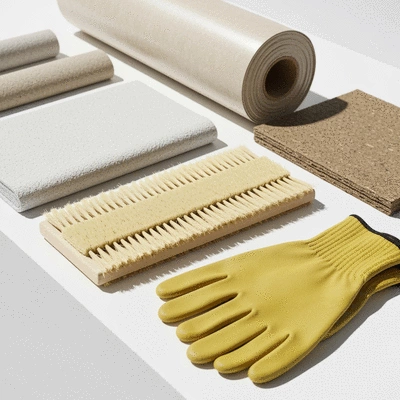
Safety Tips for Homeowners During Application
Safety should always be a priority when undertaking any DIY waterproofing project. Here are some essential safety tips to keep in mind:
- Wear protective gear: Safety glasses, gloves, and masks can protect you from fumes and potential irritants.
- Ensure proper ventilation: If you’re working with chemicals, make sure the area is well-ventilated to avoid inhaling harmful substances.
- Handle tools with care: Whether you're using power tools or simple hand tools, always follow the manufacturer's instructions to minimize accidents.
These precautions will help ensure a safe working environment as you tackle your balcony waterproofing!
Weather Considerations in Balcony Waterproofing Projects
Weather is another crucial factor that can influence the success of your waterproofing project. Planning your work around the weather will enhance the durability of your efforts. Here are key weather considerations:
- Avoid rainy days: Ensure the forecast is dry for at least 48 hours after application to allow proper curing.
- Temperature matters: Most waterproofing materials have specific temperature requirements for optimal application.
- Humidity levels: High humidity can affect curing times and the effectiveness of some materials, so check levels before starting.
By monitoring weather conditions, you can set yourself up for success and ensure your waterproofing job lasts for years to come! For additional guidance on securing your outdoor spaces, see our article on balcony leak emergency waterproofing guide.
Frequently Asked Questions About Balcony Waterproofing
Q: Why is balcony waterproofing so important?
A: Balcony waterproofing is crucial because it prevents water damage, protects the structural integrity of your home, increases the longevity of your balcony, and enhances safety by reducing the risk of slips and falls. Neglecting it can lead to costly repairs, mold growth, and decreased property value.
Q: What are the main consequences of not waterproofing my balcony?
A: Neglecting balcony waterproofing can result in structural damage due to water infiltration, mold and mildew growth that can affect health, and a significant decrease in your property's value.
Q: What steps should I take to prepare my balcony for waterproofing?
A: Before waterproofing, you should evaluate your balcony's structural integrity, inspect its drainage slope to ensure water flows away from the building, and identify any pre-existing damage like cracks or peeling paint that require repair.
Q: What kind of waterproofing materials are considered eco-friendly?
A: Eco-friendly waterproofing materials include water-based membranes that minimize VOCs, products incorporating recycled components, and biosourced products made from natural sources. These options help protect the environment and improve indoor air quality.
Q: How does weather affect the balcony waterproofing process?
A: Weather conditions significantly impact waterproofing success. It's best to avoid rainy days, ensuring a dry forecast for at least 48 hours post-application. Temperature and humidity levels also matter, as most materials have specific requirements for optimal application and curing.
Recap of Key Points
Here is a quick recap of the important points discussed in the article:
- Prevention of Water Damage: Effective waterproofing protects against moisture infiltration, preventing rot and decay.
- Increased Longevity: A well-protected balcony lasts longer, minimizing costly repairs.
- Enhanced Safety: Waterproofing reduces the risk of slips and falls caused by standing water or ice.
- Importance of Preparation: Evaluate structural integrity, inspect drainage slope, and identify pre-existing damage before waterproofing.
- Choosing Eco-friendly Materials: Opt for water-based membranes and recycled products to safeguard both your balcony and the environment.
- Safety Precautions: Wear protective gear and ensure proper ventilation during the waterproofing process.
- Weather Considerations: Avoid rainy days and monitor temperature and humidity for optimal application conditions.

